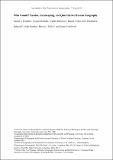Files in this item
Who counts? Gender, gatekeeping, and quantitative human geography
Item metadata
| dc.contributor.author | Franklin, Rachel | |
| dc.contributor.author | Houlden, Victoria | |
| dc.contributor.author | Robinson, Caitlin | |
| dc.contributor.author | Arribas-Bel, Daniel | |
| dc.contributor.author | Delmelle, Elizabeth | |
| dc.contributor.author | Demsar, Urska | |
| dc.contributor.author | Miller, Harvey | |
| dc.contributor.author | O'Sullivan, David | |
| dc.date.accessioned | 2022-05-09T23:47:05Z | |
| dc.date.available | 2022-05-09T23:47:05Z | |
| dc.date.issued | 2020-11-10 | |
| dc.identifier | 269805157 | |
| dc.identifier | 66e19af7-a30c-4e32-a715-bc8d544247b9 | |
| dc.identifier | 000588162600001 | |
| dc.identifier | 85096118242 | |
| dc.identifier.citation | Franklin , R , Houlden , V , Robinson , C , Arribas-Bel , D , Delmelle , E , Demsar , U , Miller , H & O'Sullivan , D 2020 , ' Who counts? Gender, gatekeeping, and quantitative human geography ' , Professional Geographer , vol. Latest Articles . https://doi.org/10.1080/00330124.2020.1828944 | en |
| dc.identifier.issn | 0033-0124 | |
| dc.identifier.other | ORCID: /0000-0001-7791-2807/work/83889538 | |
| dc.identifier.uri | https://hdl.handle.net/10023/25328 | |
| dc.description.abstract | How academic disciplines are represented and reproduced is a charged issue. In geography in particular, the challenge is not only who counts, especially with regard to gender and other factors, but also how the boundaries of the discipline are drawn and which subfields are acknowledged. This article contributes to both aspects of the discussion by extending recent research on gender, internationalization, and academic gatekeeping to additional subfields of human geography. In particular, we focus on the demographic structure and international diversity of the editorial teams of flagship quantitative geography journals. We find that women are underrepresented in our sample, with shares ranging from 23.1 to 43.5 percent—numbers unfortunately comparable to many other geography journals. We also find that career stage is an important factor and that our sample is more international and less Anglophone than the disciplinary norm. We conclude by emphasizing the importance of attending to issues of inclusive gatekeeping in geography and elsewhere. | |
| dc.format.extent | 14 | |
| dc.format.extent | 1261612 | |
| dc.language.iso | eng | |
| dc.relation.ispartof | Professional Geographer | en |
| dc.subject | Academia | en |
| dc.subject | Gender | en |
| dc.subject | Geography | en |
| dc.subject | Publication | en |
| dc.subject | Quantitative methods | en |
| dc.subject | G Geography (General) | en |
| dc.subject | H Social Sciences (General) | en |
| dc.subject | DAS | en |
| dc.subject.lcc | G1 | en |
| dc.subject.lcc | H1 | en |
| dc.title | Who counts? Gender, gatekeeping, and quantitative human geography | en |
| dc.type | Journal article | en |
| dc.contributor.institution | University of St Andrews. School of Geography & Sustainable Development | en |
| dc.contributor.institution | University of St Andrews. Bell-Edwards Geographic Data Institute | en |
| dc.contributor.institution | University of St Andrews. Environmental Change Research Group | en |
| dc.identifier.doi | 10.1080/00330124.2020.1828944 | |
| dc.description.status | Peer reviewed | en |
| dc.date.embargoedUntil | 2022-05-10 |
This item appears in the following Collection(s)
Items in the St Andrews Research Repository are protected by copyright, with all rights reserved, unless otherwise indicated.

